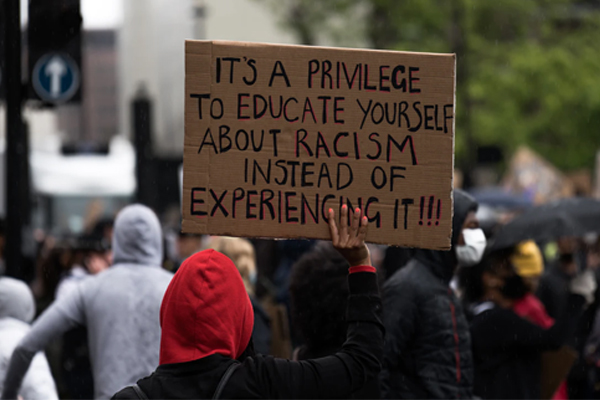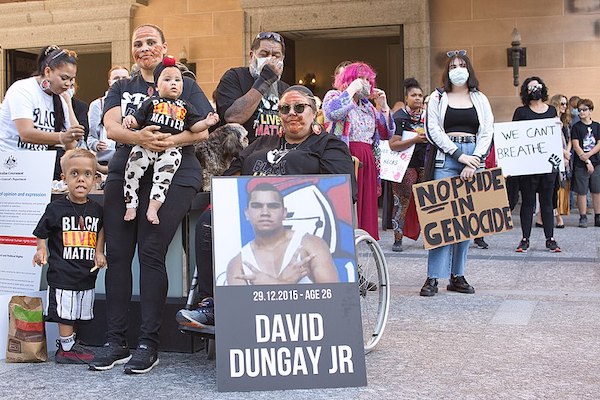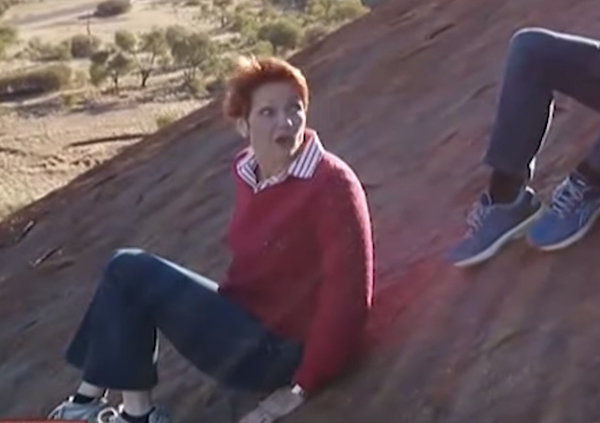When it comes to listening to Aboriginal and Torres Strait Islander people, most politicians and the media do no better than an outward "performance" of listening while actually excluding key voices, writes Celeste Liddle.
ACCORDING to anecdotal evidence conveyed by Ryan "Fitzy" Fitzgerald on The Project, Pauline Hanson arrived at Uluru on Wednesday (21 August), climbed up to "Chicken Rock" (where the chains begin for people who embark upon the full ascent), slid back down on her backside and then, several hours later, met with some Anangu elders to "get permission" to climb Uluru.
It was an elaborate media stunt by Hanson, geared around showing just how little respect she has for the local traditional owners and their ruling to close the climb in October — while she concurrently pretends to respect traditional owners by posing for photos with them and expressing "concern" with regards to impacts on regional tourism should the climb close. Why do I say this? For the simple reason that for months she has been exhibiting this disrespect in the media while she stirs up the rabid hordes who hang around her social media channels.
This entire disrespectful farce was but one illustration of how things have gone when it comes to showing respect for Indigenous rights and views.
On Monday 19 August) there was an episode of ABC's Q&A on constitutional reform for Aboriginal and Torres Strait Islander people and the Voice to Parliament. It could have been quite an interesting discussion.
Instead, key debates were truncated for the purposes of television, audience questions went unanswered at times and the only guest opposed to constitutional reform for recognition and a voice was Jacinta Price. I'm not saying Price should not have been a part of the conversation, but as she is a conservative tending alt-right at times, Price was incapable of adequately representing the views of a much larger group of Indigenous dissenters — the sovereignty activists.
It's ironic really. Had it not been for sovereignty activist voices eventually breaking through the cacophony of ill-informed white men and highlighting Indigenous dissent to the Recognise campaign – as well as the lack of community consultation, combined with some members of the Expert Panel highlighting just how far the Government had taken the discussion off course – community consultations may not have even taken place leading eventually to the summit at Uluru.
Both Price and Clayton Simpson were correct in highlighting that there were community members who walked out of that gathering, but when it came to Q&A properly discussing why, the audience was left wanting.
"How on Earth can a Government who cannot value the cultural heritage of the people they're meant to be negotiating treaty provisions with even pretend that they are working in good faith with these communities?"
In short, despite all that had been learnt from the expensive fiasco which was the Recognise campaign, the media still persists in painting pro-recognition voices as progressives and anti-recognition voices as conservatives. The reality of the situation has always been far more complex. If Australia is potentially going to go to the polls to vote on constitutional change based on Indigenous rights, they owe it to themselves to be across the breadth of Indigenous views relating to these questions.
Finally, in Victoria this week, there have been two major developments when it comes to the fight for Indigenous rights. The first has been the announced forced eviction of Djab Wurrung Tent Embassy, who have been fighting for over a year to save birthing and placenta trees being bulldozed in the Victorian Government's Western Highway expansion project. Apparently saving a few seconds driving on a highway is worth significantly more than 800-year-old cultural sites used to bring approximately 10,000 Djab Wurrung people safely into the world.
To rub further salt into the wound, alternate routes which would save these trees that were both shorter and cheaper to build had been proposed. Former senior advisor for VicRoads David Clark has this week gone on the record to criticise VicRoads for not even considering the "Northern route". As also highlighted in this excellent piece in The Conversation, the Victorian Government is concurrently seeking heritage listing of parts of Melbourne's Eastern Freeway, thus continuing a long history of valuing roads over Indigenous heritage and the livelihoods of society's most disadvantaged.
At this moment, the Victorian Government is seeking to advance treaty discussions in this State. How on Earth can a Government who cannot value the cultural heritage of the people they're meant to be negotiating treaty provisions with, even pretend that they are working in good faith with these communities?
Surely protection of culture, heritage and lands should be a core part of any such discussions. Instead, Premier Andrews stated that protesters had "made their point" and it was time for them to move on. As protesters continue to amass at the Embassy in support of the Djab Wurrung, it appears that Andrews is missing the point entirely — unlike thinking members of his constituency.
In slightly more positive news, it was announced on Thursday (August 22) that public drunkenness laws — laws which, as highlighted in the Royal Commission into Aboriginal Deaths in Custody, have been used to disproportionately criminalise Aboriginal people — would be repealed in Victoria. This announcement followed a long campaign by the family of Aunty Tanya Day — an Aboriginal woman who had been arrested while taking a train journey and died from an injury sustained while in custody.
Following the announcement by the Victorian Government, Tanya's family released a statement in which they express:
'This is a bittersweet moment for our family and community that have lost [a] loved one to this discriminative law. Had the government acted on the Royal Commission's recommendations that were presented nearly 30 years [ago] our mother and other Aboriginal people would still be here today.'
Certainly, while people of Victoria owe Tanya's family a debt of gratitude because their fight in their mother's name has, at the end of the day, benefited us all, we should never forget that, had the Victorian Government listened and acted upon the Royal Commission recommendations, Tanya and others would still be with us today. Many other Aboriginal people would not have criminal records or experiences of police harassment either.
To summarise, it appears that when it comes to listening to Aboriginal and Torres Strait Islander people, most politicians and the media do no better than an outward "performance" of listening — whether it's posed photos with Elders, statements on treaties, or holding forums on the Voice while actually excluding some key voices. At the end of the day, all it really demonstrates is how deeply embedded racism is in Australia's structures and how far we truly have to go.
Celeste Liddle is an Arrernte woman, trade unionist and a freelance opinion writer and social commentator. Read more from Celeste on her blog Rantings of an Aboriginal Feminist or follow her on Twitter @Utopiana. This article was originally published on Eureka Street and is republished with permission.
Support independent journalism Subscribe to IA.












